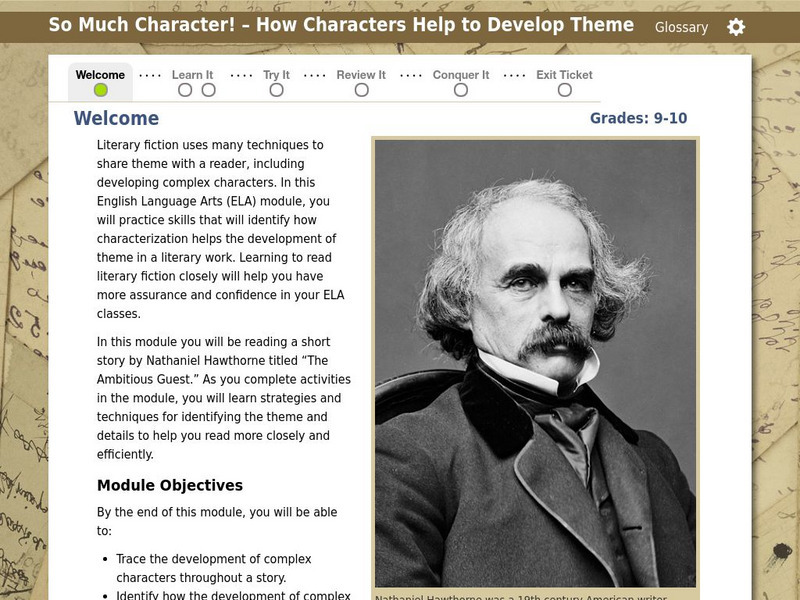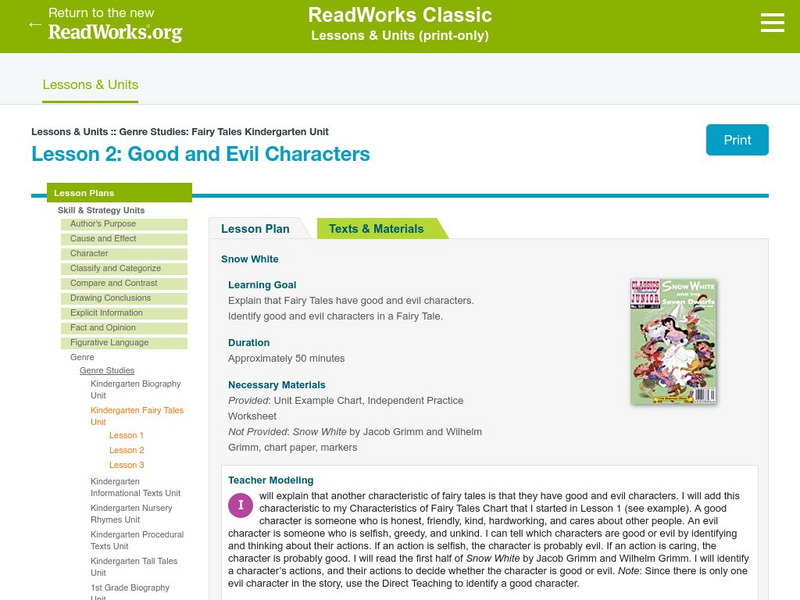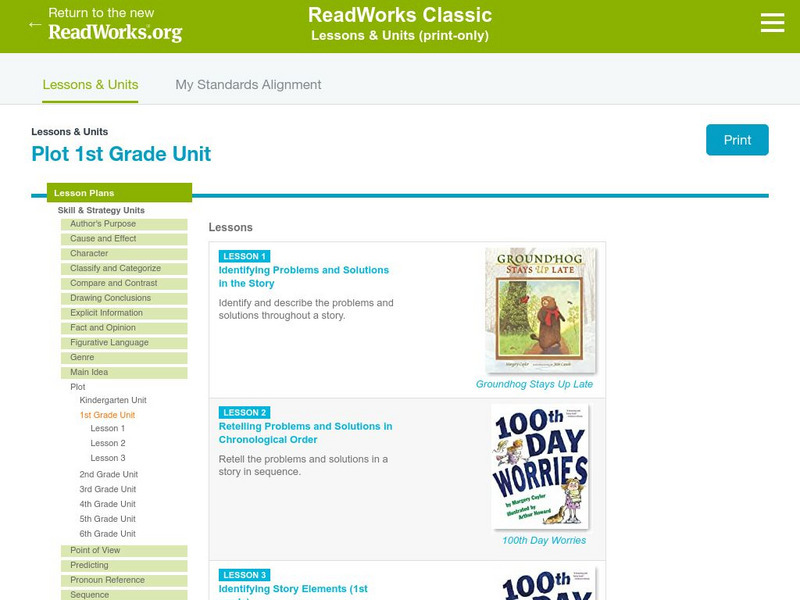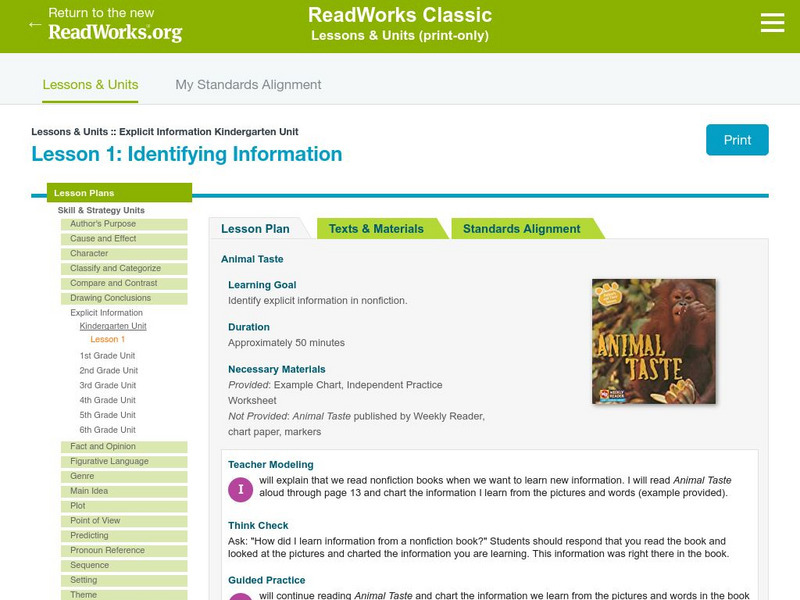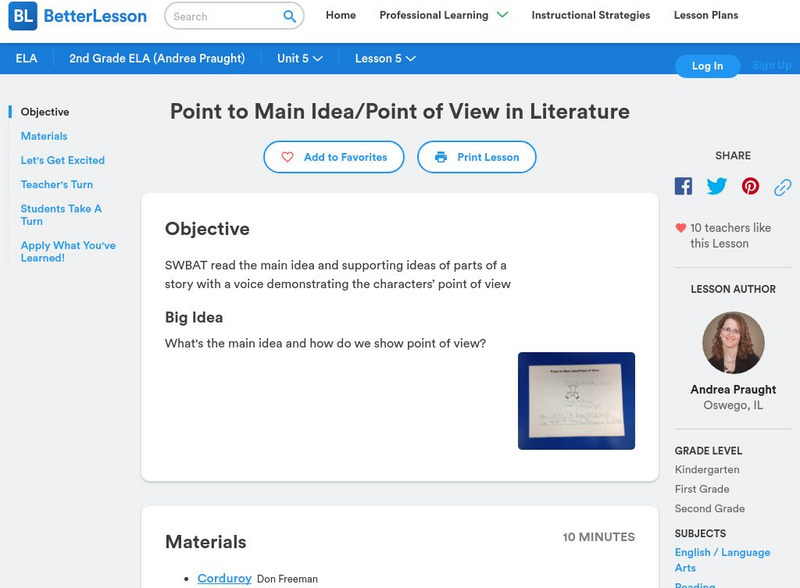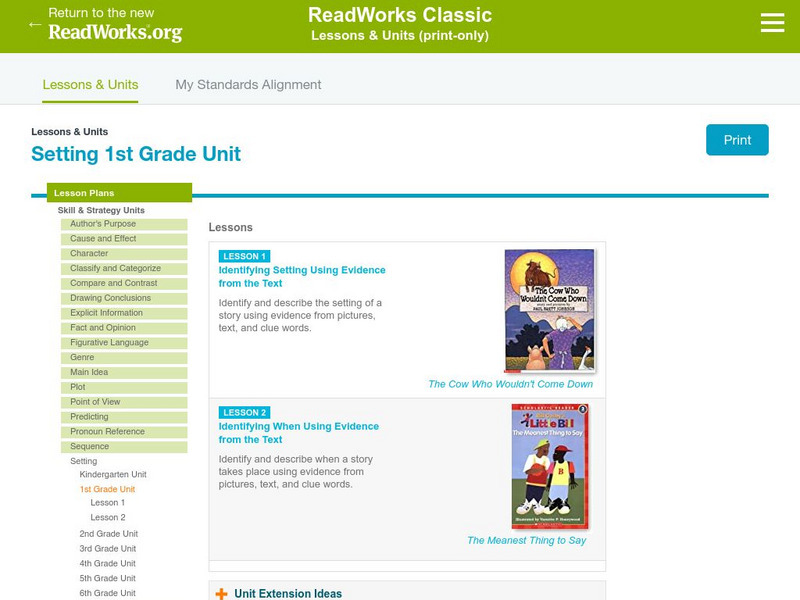Better Lesson
Better Lesson: rl.k.3 With Prompting and Support, Identify Characters, Settings,
This landing page provides different lesson plan choices on teaching RL.K.3 With prompting and support, identify characters, settings,
Success Link
Success Link: Characters, Setting, Plot, Conclusion, and Summarizing a Story
This lesson plan offers a step-by-step procedure for teaching students how to identify story elements and to summarize a story. It explains how to use a "Who Am I" activity, as well as a linkage activity in identifying characters and...
Texas Education Agency
Texas Gateway: Analyze Differences in Characters' Moral Dilemmas
[Accessible by TX Educators. Free Registration/Login Required] This lesson focuses on moral dilemmas that characters face including defining and identifying moral dilemmas, an American dilemma, and in other countries. Then students...
Curated OER
Mc Graw Hill: Lesson C: Identify Point of View
Discover information about characters and their thoughts and feelings in a story. CCSS.ELA-Literacy.CCRA.R.6
Thinkport Education
Thinkport: So Much Character! How Characters Help to Develop Theme
A module to practice skills that will identify how characterization helps the development of theme in a literary work.
Curated OER
Mc Graw Hill: Compare Characters' Point of View
Defines and explains how to show how different characters think and feel.
Read Works
Read Works: Lesson 2: Good and Evil Characters
This lesson will allow students to understand why Fairy Tales have good and evil characters and identify good and evil characters in a Fairy Tale.
Annenberg Foundation
Annenberg Learner: Interactives: Elements of a Story: Characters
The interactive story lesson engages students in the study of "characters" and terms associated with them. Using the story of Cinderella as an anchor story, students will identify the following: hero, villain, protagonist, antagonist,...
Read Works
Read Works: Kindergarten: Character: Lesson 1: Physical Attributes of a Character
[Free Registration/Login Required] A lesson plan, based on David McPhail's Lost!, in which students are introduced to literary characters and explore the various clues, such as descriptions and illustrations, that communicate a...
Alabama Learning Exchange
Alex: Reading and Writing About Miss Moo
Lesson for early elementary and special education students utlizing the book Miss Moo Goes to the Zoo by Kelly Graves and graphic organizers to identify elements in a story (title, author, setting, characters, etc.). Students participate...
Read Works
Read Works: Plot 1st Grade Unit
[Free Registration/Login Required] A series of three lesson plans designed to teach students to identify problems and solutions in fiction text and to retell a story's problem and solution in sequence. Students learn to identify the plot...
Read Works
Read Works: Grade 2: Two Lesson Unit: Setting
[Free Registration/Login Required] A set of two lesson plans designed to teach students to use context clues to identify the setting and changes within it. Lessons are based on the books Bigmama's by Donald Crews and The Stories Julian...
Alabama Learning Exchange
Alex: Let's Get to Know Big Al
During this lesson the students will read and discuss the story Big Al, by Andrew Clements. Students will identify the story elements of Big Al and complete a story element map. Students will also do a character analysis of Big Al.
Read Works
Read Works: Explicit Information Kindergarten Unit: Identifying Information
[Free Registration/Login Required] Use Animal Taste by Kirsten Hall to teach students to find explicit information inside informational texts. Includes ideas for teaching, guided practice, and independent practice. Although the book is...
Library of Congress
Loc: How to Find a Novel,etc. Without Knowing Its Title or Author
Use this guide to help identify a literary work when they know only its plot or subject, or other textual information such as a character's name, a line of poetry, or a unique word or phrase. Trusted databases, library catalogs, and more...
ABCya
Ab Cya: Keyboarding Challenge: Learn the Keyboard
Learn basic keyboarding with this interactive keyboard. The focus is on identifying letter positions on the keyboard. Responses are checked immediately.
New Zealand Ministry of Education
Nz Ministry of Education: What a Character
Students will explore characters created by authors and identify personality traits, and then apply these ideas to their own characters using language skills identified to convey these traits. Students will write a character sketch,...
Read Works
Read Works: Grade 1: Three Lesson Unit: Character: Actions, Feelings, Looks
[Free Registration/Login Required] A series of three lesson plans, based on David Shannon's books No, David!, David Gets in Trouble, and David Goes to School. Students learn how to utilize text and picture clues to determine and describe...
Louisiana Department of Education
Louisiana Doe: Louisiana Believes: English Language Arts, Grade 10: Macbeth
Students explore the ideas of ambition and failure. They learn that conflicts serve as the basis of a text's meaning and that identifying the internal and external conflicts of a story reveals the motivations of complex characters. They...
Read Works
Read Works: Grade 2: Three Lesson Unit: Plot
[Free Registration/Login Required] A series of three lesson plans designed to teach young scholars to identify story elements, retell a story using story elements, and see how characters affect the plot. Lessons are based on the books...
Read Works
Read Works: 2nd Grade Lesson: Personification
[Free Registration/Login Required] Learners will use the book The Runaway Tortilla by Eric A. Kimmel to learn to identify and understand the use of personification in a fiction text. Lesson includes direct teaching, guided practice, and...
Better Lesson
Better Lesson: Point to Main Idea/point of View in Literature
This lesson uses the story Corduroy by Don Freeman to teach the main idea and supporting details of a story, as well as what we mean by the character's point of view. The lesson is done using print materials and a whiteboard with...
ReadWriteThink
Read Write Think: Exploring Character Through Images
This lesson plan explores Curious George in relation to images conveying character. Included in the lesson plan is an overview, practice, objectives, resources, preparation, and more.
Read Works
Read Works: Setting 1st Grade Unit
[Free Registration/Login Required] A series of three lesson plans designed to teach students to use pictures and word clues to determine the setting of fiction texts. Lessons are based on the books The Cow Who Wouldn't Come Down by Paul...




